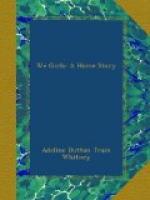The doors right through from front to back, and the wide windows at either end and all the way, gave such sweep and light; also the long mirrors, that had been from time unrememberable over the mantels in the town parlors, in the old, useless, horizontal style, and were here put, quite elegantly tall,—the one in Mrs. Holabird’s room above her daintily appointed dressing-table (which was only two great square trunks full of blankets, that could not be stowed away anywhere else, dressed up in delicate-patterned chintz and set with her boxes and cushions and toilet-bottles), and the other, in “the girls’ room,” opposite; these made magnificent reflections and repetitions; and at night, when they all lit their bed-candles, and vibrated back and forth with their last words before they shut their doors and subsided, gave a truly festival and illuminated air to the whole mansion; so that Mrs. Roderick would often ask, when she came in of a morning in their busiest time, “Did you have company last night? I saw you were all lit up.”
“We had one candle apiece,” Barbara would answer, very concisely.
“I do wish all our windows didn’t look Mrs. Roderick’s way,” Rosamond said once, after she had gone.
“And that she didn’t have to come through our clothes-yard of a Monday morning, to see just how many white skirts we have in the wash,” added Barbara.
But this is off the track.
“What is it, Ruth?” asked Mrs. Holabird, as she came in upon the little figure in the white chair, midway in the long light through the open rooms. “You didn’t really mind Stephen, did you?”
“O no, indeed, aunt! I was only thinking out things. I believe I’ve done, pretty nearly. I guess I sha’n’t go. I wanted to make sure I wasn’t provoked.”
“You’re talking from where you left off, aren’t you, Ruthie?”
“Yes, I guess so,” said Ruth, laughing. “It seems like talking right on,—doesn’t it?—when you speak suddenly out of a ‘think.’ I wonder what alone really means. It doesn’t ever quite seem alone. Something thinks alongside always, or else you couldn’t keep it up.”
“Are you making an essay on metaphysics? You’re a queer little Ruth.”
“Am I?” Ruth laughed again. “I can’t help it. It does answer back.”
“And what was the answer about this time?”
That was how Ruth came to let it out.
“About going over to the Marchbanks’s to-night. Don’t say anything, though. I thought they needn’t have asked me just to play. And they might have asked somebody with me. Of course it would have been as you said, if I’d wanted to; but I’ve made up my mind I—needn’t. I mean, I knew right off that I didn’t.”
Ruth did talk a funny idiom of her own when she came out of one of her thinks. But Mrs. Holabird understood. Mothers get to understand the older idiom, just as they do baby-talk,—by the same heart-key. She knew that the “needn’t” and the “didn’t” referred to the “wanting to.”




